Organic vs synthetic fertilizers: which is best for cannabis?
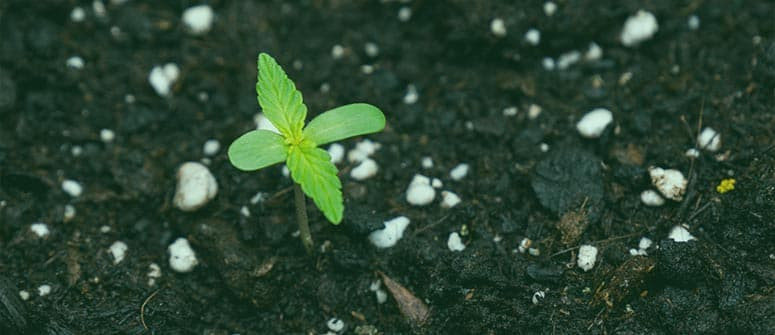
Choosing between organic and synthetic fertiliser for cannabis can be tricky, especially for beginner growers. In this article, we take an in-depth look at the differences and pros/cons of organic and non-organic cannabis nutrients. Find out which one is best for your grow-op—you might even consider using both!
Contents:
When it comes to deciding how to feed cannabis plants, growers are confronted by two very attractive, yet starkly different, fertilisation options: synthetic and organic. In this article, we'll teach you all there is to know about the benefits and limitations of both organic and synthetic fertilisers to help you choose the ideal products for your grow.
THE IMPORTANCE OF FERTILISER FOR CANNABIS PLANTS
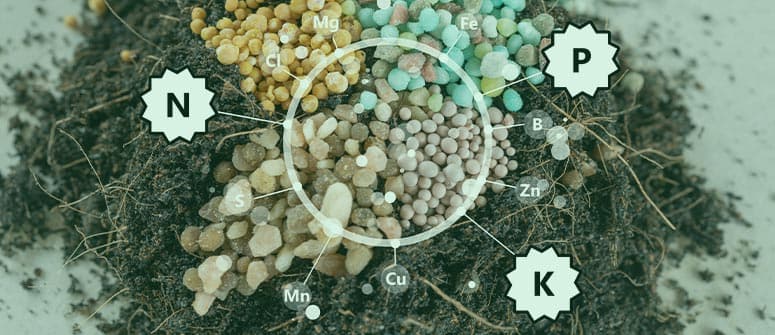
Fertiliser is vital for growing healthy, happy cannabis plants. While cannabis is a hardy plant often likened to a weed, in order to develop the dense, resinous flowers smokers crave, plants actually require a fair amount of fertilisation. Without it, they tend to grow slower and develop lighter, wispier flowers that weigh less and contain less resin.
The three core macronutrients all plants need to survive are nitrogen (N), phosphorus (P), and potassium (K). Any store-bought fertiliser worth its weight should contain a tailored concentration of at least these three nutrients. Cannabis plants require a healthy dose of nitrogen during their vegetative stage, and higher levels of phosphorus and potassium during bloom in order to develop big, resinous buds.
Besides the core macronutrients, cannabis also requires “secondary” macronutrients—namely, calcium, magnesium, and sulphur. These elements are deemed "secondary" as plants require decent amounts of each, but still significantly less compared to NPK.
And then there are micronutrients. Despite only being required in trace amounts, these elements still play a vital role in supporting plant health. Some of the most important micronutrients for cannabis are:
- Boron
- Chloride
- Copper
- Manganese
- Molybdenum
- Nickel
- Zinc
Ultimately, in order to grow the healthiest weed plants possible, you'll want to ensure your specimens have access to a rich mix of macro and micronutrients throughout their life cycle.
WHAT IS ORGANIC FERTILISER?

Organic fertilisers are derived from organic matter containing varying concentrations of macro and micronutrients. Moreover, many organic fertilisers contain beneficial microorganisms, such as bacteria and fungi, that help to break down nutrients to make them readily available to plants, as well as promote healthy root growth and protect your plants against pathogens and pests.
While most gardening centres and grow stores stock a variety of all-natural fertilisers, it is also possible to make your own organic fertiliser at home.
Some examples of natural fertilisers include:
- Compost
- Worm castings
- Manure
- Blood and bone meals
- Mineral sources (such as dolomite)
WHAT IS SYNTHETIC FERTILISER?
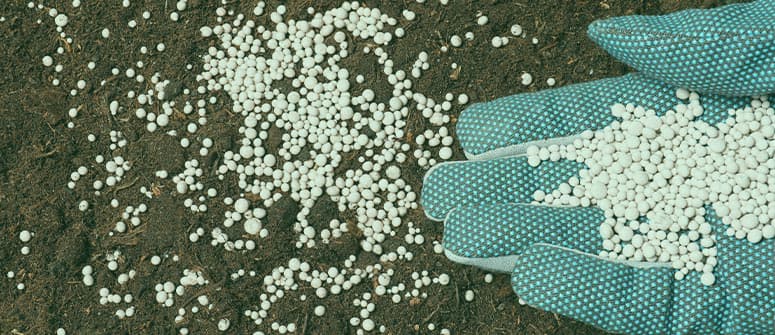
Synthetic fertilisers are man-made and typically synthesised in a laboratory. Rather than containing natural sources of nutrients, which take time to break down and be absorbed by plants, synthetic fertilisers contain exact concentrations of macro and micronutrients that are ready to be consumed by your plants as soon as you feed them.
Whereas an organic fertiliser like worm castings (which is naturally rich in nitrogen) delivers a slow release of nutrients into the substrate, a nitrogen-rich synthetic fertiliser delivers nitrogen in a form that can be absorbed by plants immediately.
Some common examples of synthetic fertilisers include:
- Miracle-Gro (not recommended for cannabis)
- Top Crop Tri Pack
- Fox Farm Liquid Nutrient Trio
- General Hydroponics Flora Grow Bloom Micro Combo
- Advanced Nutrients Bloom, Micro, & Grow combo
ORGANIC VS SYNTHETIC FERTILISER
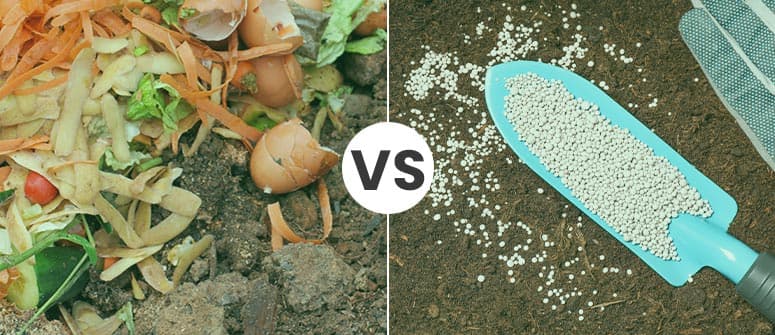
There are a few key differences between organic and synthetic fertiliser, including cost, ease of use, and, of course, the final product. While we're strong advocates for organic cannabis cultivation, and believe every home grower should attempt to run an organic cannabis grow room/garden at some point, we understand that synthetics have long been, and continue to be, the norm among cannabis growers.
With that said, let's examine the pros and cons of both organic and synthetic fertilisers in more detail.
COST
The cost of fertiliser is, of course, an important consideration for most cannabis growers. And while organic cannabis nutrients are often thought to be more expensive than synthetic, that isn't always the case.
ORGANIC
Organic liquid fertilisers tend to be more expensive than synthetic nutrients. They also tend to contain lower concentrations of both macro and micronutrients, and therefore most growers find they need to feed their plants more regularly. However, solid organic matter, such as compost or worm castings, are very nutrient rich and feed plants gradually over an extended period, making them an attractive option for budget-conscious growers trying to go organic. Also, using organic fertiliser grants growers the opportunity to reuse their soil after every grow, which translates into serious savings, especially for those producing multiple harvests per year.
SYNTHETIC
There are countless synthetic nutrient ranges on the market that sell at drastically different prices. In general, though, synthetic liquid fertilisers tend to be cheaper than organic, and contain higher concentrations of macronutrients and micronutrients, offering growers more bang for their buck—especially those growing multiple plants at a time. However, keep in mind that it's a lot harder to reuse soil that's been exposed to chemical nutrients than soil that's been enriched organically.
EASE OF USE
Usability, or ease of use, is an important consideration when choosing how to fertilise your cannabis plants, especially for novices. Both organic and synthetic have pros and cons in this realm, though in different respects.
ORGANIC
One of the most attractive features of organic fertilisers is that it is much harder to overfeed your plants. That's because the nutrients in organic matter take time to be broken down and absorbed. However, it's also important to note that, for the same reason, organic fertilisers deliver nutrients much more gradually than synthetic fertilisers. With synthetic nutrients, you might detect changes in your plants just days after feeding them; with organic nutrients, this can take anywhere from 1–2 weeks.
SYNTHETIC
Using synthetic nutrients also has its benefits. First and foremost, feeding is much more precise; thanks to dialled-in concentrations of each nutrient, synthetic fertilisers allow you to feed your plants with precisely the amount of feed they need at a particular time. Also, identifying and addressing nutrient deficiencies or toxicities is a lot simpler with chemical nutrients, due to their fast absorption. If your plants are showing signs of deficiency, for example, you'll be able to address this issue much faster with a synthetic fertiliser that your plant can assimilate immediately than with an organic fertiliser.
However, the rapid absorption of synthetic nutrients also makes it much easier to overfeed your plants, which can stunt their growth, damage roots, and ultimately drive down both the size and quality of your harvests.
BUD QUALITY
Yield size and quality are, of course, super important topics for cannabis growers. Both synthetic and organic fertilisers can deliver excellent results come harvest time, and choosing one over the other will come down to your personal preference.
ORGANIC
Most growers agree that organically grown cannabis develops more complex and intense aromas than synthetically grown bud. Furthermore, many organic growers find that they don't need to perform a flush prior to harvest, as plants simply take up what they need from the substrate, leaving the rest behind.
SYNTHETIC
Whereas organic nutrients tend to produce buds with better aromas, synthetic fertilisers take the cake when it comes to yield size and bud structure. Cannabis plants fed with synthetic nutrients typically produce much denser, heavier, and more resinous flowers than organically grown plants, making synthetic fertilisers a top choice for growers who prefer bigger yields, or commercial growers supplying dispensaries or other legal cannabis retailers.
RISKS
There are a few risks to fertilising that cannabis growers need to be aware of when using both organic and synthetic options.
ORGANIC
The main risk with organic fertilisers is that it's a much less "precise" process. Subtle differences in nutrient composition, soil structure, or genetics can alter the size and quality of your harvests. If you're accustomed to the precise nature of growing and feeding cannabis with synthetic fertilisers, it might take some time to get used to the more unpredictable nature of growing organically.
SYNTHETIC
Growing cannabis with synthetic nutrients has much more serious risks. Overfeeding can cause extreme stress and stunt the growth of your plants, while the prolonged use of chemical fertilisers can also lead to nutrient buildup in the soil, which can cause nutrient burn or deficiencies. In general, feeding cannabis synthetically is a very precise process that allows little room for error. If you're new to growing cannabis, it'll likely take some time to learn how to properly feed your plants with synthetic nutrients.
CAN YOU USE ORGANIC AND SYNTHETIC FERTILISER AT THE SAME TIME?
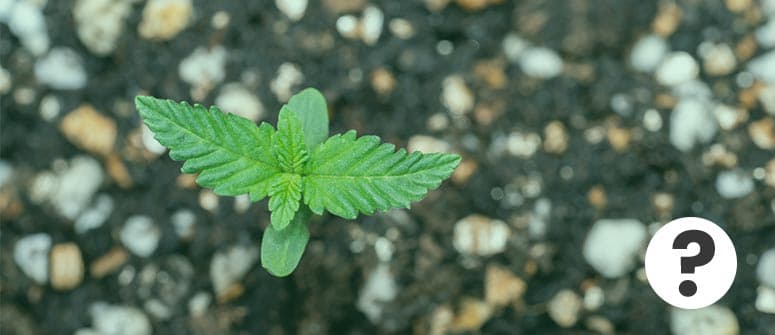
Combining organic and synthetic nutrients isn't just possible; it's often a great solution for home growers, allowing them to reap the unique benefits of each type and produce the best possible harvest. For example, you might want to start your plants off in an organic, home-made super soil, which will keep your plants fed for several weeks. You could then re-feed your plants with more organic fertiliser as you see fit, and use a synthetic bloom booster during the mid–late flowering stage to boost your plants' bud production prior to harvest.
This way, you'll end up with the big, dense flowers you're used to from a synthetic grow, while still being able to reuse your soil post-harvest because it hasn't been damaged from the excessive use of synthetic fertiliser.
This is just one example of how you can combine organic and synthetic nutrients when growing cannabis. If you're used to using exclusively synthetic fertilisers, perhaps try to explore integrating organic into your routine. You might find the inclusion worthwhile, and, who knows, you may even switch over to organic altogether.




